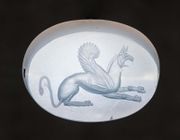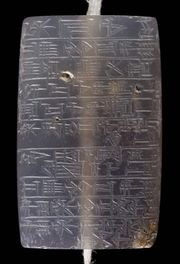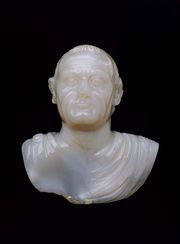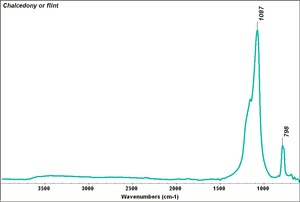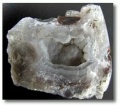Difference between revisions of "Chalcedony"
| Line 1: | Line 1: | ||
[[File:Griffin scarab 621153.jpg|thumb|Griffin scarab<br>MFA# 62.1153]] | [[File:Griffin scarab 621153.jpg|thumb|Griffin scarab<br>MFA# 62.1153]] | ||
== Description == | == Description == | ||
| − | + | [[File:Amulet 98697.jpg|thumb|Babylonian amulet<br>MFA# 98.697]] | |
A translucent, quartz stone with usually a waxy luster. Chalcedony has tiny microscopic crystals that are sometimes arranged in slender fibrous bands. [[agate|Agates]] are a banded variety of chalcedony. A glassy red chalcedony is known as [[carnelian]] or [[sard]]. A dull green variety colored with nickel oxide is called [[chrysoprase]]. Plasma is a bright emerald green chalcedony that is called [[bloodstone]] when it contains small red spots of [[jasper]]. Chalcedony has been mined or gathered since Paleolithic times. It was used as beads, amulets and seals and is still used as an ornamental stone and gemstone. | A translucent, quartz stone with usually a waxy luster. Chalcedony has tiny microscopic crystals that are sometimes arranged in slender fibrous bands. [[agate|Agates]] are a banded variety of chalcedony. A glassy red chalcedony is known as [[carnelian]] or [[sard]]. A dull green variety colored with nickel oxide is called [[chrysoprase]]. Plasma is a bright emerald green chalcedony that is called [[bloodstone]] when it contains small red spots of [[jasper]]. Chalcedony has been mined or gathered since Paleolithic times. It was used as beads, amulets and seals and is still used as an ornamental stone and gemstone. | ||
| − | |||
[[File:Vespasian 98768.jpg|thumb|Roman Chalcedony bust<br>MFA# 98.768]] | [[File:Vespasian 98768.jpg|thumb|Roman Chalcedony bust<br>MFA# 98.768]] | ||
== Synonyms and Related Terms == | == Synonyms and Related Terms == | ||
| Line 14: | Line 13: | ||
== Physical and Chemical Properties == | == Physical and Chemical Properties == | ||
| − | No visible crystals. Sometimes weakly fluorescent. | + | * No visible crystals. |
| − | + | * Sometimes weakly fluorescent. | |
| − | Fracture = conchoidal. Streak = white. Luster = waxy to vitreous | + | * Fracture = conchoidal. |
| + | * Streak = white. | ||
| + | * Luster = waxy to vitreous | ||
{| class="wikitable" | {| class="wikitable" | ||
| Line 27: | Line 28: | ||
|- | |- | ||
! scope="row"| Density | ! scope="row"| Density | ||
| − | | 2.65 | + | | 2.65 g/ml |
|} | |} | ||
Revision as of 10:16, 28 May 2022
Description
A translucent, quartz stone with usually a waxy luster. Chalcedony has tiny microscopic crystals that are sometimes arranged in slender fibrous bands. Agates are a banded variety of chalcedony. A glassy red chalcedony is known as Carnelian or Sard. A dull green variety colored with nickel oxide is called Chrysoprase. Plasma is a bright emerald green chalcedony that is called Bloodstone when it contains small red spots of Jasper. Chalcedony has been mined or gathered since Paleolithic times. It was used as beads, amulets and seals and is still used as an ornamental stone and gemstone.
Synonyms and Related Terms
carnelian; sard; agate; chrysoprase; citrine; onyx; sardonyx; plasma; bloodstone; jasper; flint; plasma; Chalcedon (Deut.); calcedonia (Esp.); chalcédoine (Fr.); calcédoine (Fr.); chalcedon (Pol.); calcedônia (Port.); chalcedoon (Ned.)
Physical and Chemical Properties
- No visible crystals.
- Sometimes weakly fluorescent.
- Fracture = conchoidal.
- Streak = white.
- Luster = waxy to vitreous
| Composition | SiO2 |
|---|---|
| Mohs Hardness | 6.5-7.0 |
| Density | 2.65 g/ml |
Comparisons
Properties of Common Gemstones
Additional Images
Resources and Citations
- Mineralogy Database: Quartz
- Jack Odgen, Jewellery of the Ancient World, Rizzoli International Publications Inc., New York City, 1982
- Dictionary of Building Preservation, Ward Bucher, ed., John Wiley & Sons, Inc., New York City, 1996
- Luciana and Tiziano Mannoni, Marble: the history of a culture, Facts on File Publications
- A.Lucas, J.R.Harris, Ancient Egyptian Materials and Industries, Edward Arnold Publishers Ltd., London, 4th edition, 1962
- C.W.Chesterman, K.E.Lowe, Audubon Society Field Guide to North American Rocks and Minerals, Alfred A. Knopf, New York, 1979
- Sue Fuller, Rocks and Minerals, DK Publishing, Inc., New York City, 1995
- Encyclopedia Britannica, http://www.britannica.com Comment: "chalcedony" Encyclopædia Britannica [Accessed December 4, 2001].
- G.S.Brady, Materials Handbook, McGraw-Hill Book Co., New York, 1971 Comment: p. 647
- Richard S. Lewis, Hawley's Condensed Chemical Dictionary, Van Nostrand Reinhold, New York, 10th ed., 1993
- Van Nostrand's Scientific Encyclopedia, Douglas M. Considine (ed.), Van Nostrand Reinhold, New York, 1976
- Random House, Webster's Encyclopedic Unabridged Dictionary of the English Language, Grammercy Book, New York, 1997
- The American Heritage Dictionary or Encarta, via Microsoft Bookshelf 98, Microsoft Corp., 1998
